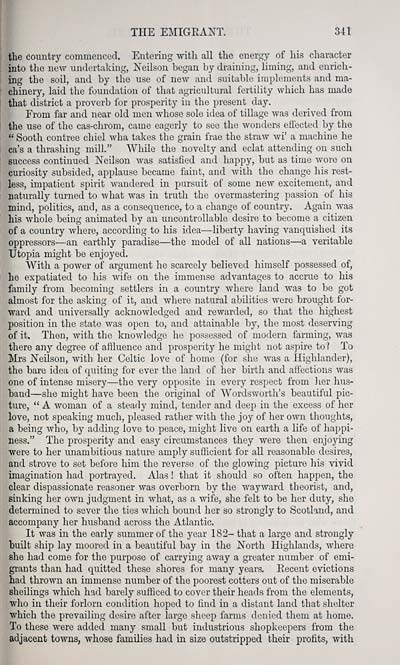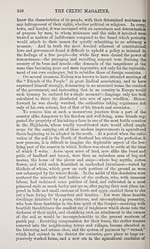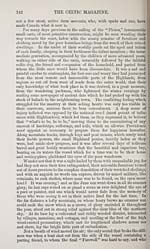Blair Collection > Celtic magazine > Volume 5
(351)
Download files
Complete book:
Individual page:
Thumbnail gallery: Grid view | List view

THE EMIGRANT. 341
the country commenced. Entering with all the energy of his character
into the new undertaking, ISTeilson began by draining, liming, and enrich-
ing the soil, and by the use of new and suitable implements and ma-
chinery, laid the foundation of that agricultural fertility which has made
that district a proverb for prosperity in the present day.
From far and near old men whose sole idea of tillage was derived from
the use of the cas-chrom, came eagerly to see the wonders ejected by the
" Sooth contree duel wha takes the grain frae the straw wi' a machine he
ca's a thrashing mill." AVhile the novelty and eclat attending on such
success continued ISTeilson was satisfied and happy, but as time wore on
curiosity subsided, applause became faint, and with the change his rest-
less, impatient spirit wandered in pursuit of some new excitement, and
naturally turned to what was in truth the overmastering passion of his
mind, politics, and, as a consequence, to a change of country. Again Avas
his whole being animated by an uncontrollable desire to become a citizen
of a country where, according to his idea — liberty having vanquished its
oppressors — an earthly paradise — the model of all nations — a veritable
Utopia might be enjoyed.
With a power of argument he scarcely believed himself possessed of,
he expatiated to his wife on the immense advantages to accrue to his
family from becoming settlers in a country where land was to be got
almost for the asking of it, and where natural abilities were brought for-
ward and universally acknowledged and rewarded, so that the highest
position in the state was open to, and attainable by, the most deserving
of it. Then, with the knowledge he possessed of modern farming, was
there any degree of afliuence and prosperity he might not aspire to? To
Mrs JSTeilson, with her Celtic love of home (for she was a Highlander),
the bare idea of quiting for ever the land of her birth and affections was
one of intense misery — the very opposite in every respect from lier hus-
band — she might have been the original of Wordsworth's beautiful pic-
ture, " A woman of a steady mind, tender and dee]) in the excess of her
love, not speaking much, pleased rather with the joy of her own thoughts,
a being who, by adding love to peace, might live on earth a life of happi-
ness." The prosperity and easy circumstances they were then enjoying
were to her unambitious nature amply sufficient for all reasonable desires,
and strove to set before him the reverse of the glowing picture his vivid
imagination had portrayed. Alas ! that it should so often happen, the
clear dispassionate reasoner was overborn by the wayward theorist, and,
sinking her own judgment in what, as a wife, she felt to be her duty, she
determined to sever the ties which bound her so strongly to Scotland, and
accompany her husband across the Atlantic.
It was in the early summer of the year 182- that a large and strongly
built ship lay moored in a beautiful bay in the North Highlands, where
she had come for the purpose of carrying away a greater number of emi-
grants than had quitted these shores for many years. Eecent evictions
had thrown an immense number of the poorest cotters out of the miserable
sheilings which had barely sufficed to cover their heads from the elements,
who in their forlorn condition hoped to find in a distant land that shelter
which the prevailing desire after large sheep farms denied them at home.
To these were added many small but industrious shopkeepers from the
adjacent towns, whose families had in size outstripped their profits, with
the country commenced. Entering with all the energy of his character
into the new undertaking, ISTeilson began by draining, liming, and enrich-
ing the soil, and by the use of new and suitable implements and ma-
chinery, laid the foundation of that agricultural fertility which has made
that district a proverb for prosperity in the present day.
From far and near old men whose sole idea of tillage was derived from
the use of the cas-chrom, came eagerly to see the wonders ejected by the
" Sooth contree duel wha takes the grain frae the straw wi' a machine he
ca's a thrashing mill." AVhile the novelty and eclat attending on such
success continued ISTeilson was satisfied and happy, but as time wore on
curiosity subsided, applause became faint, and with the change his rest-
less, impatient spirit wandered in pursuit of some new excitement, and
naturally turned to what was in truth the overmastering passion of his
mind, politics, and, as a consequence, to a change of country. Again Avas
his whole being animated by an uncontrollable desire to become a citizen
of a country where, according to his idea — liberty having vanquished its
oppressors — an earthly paradise — the model of all nations — a veritable
Utopia might be enjoyed.
With a power of argument he scarcely believed himself possessed of,
he expatiated to his wife on the immense advantages to accrue to his
family from becoming settlers in a country where land was to be got
almost for the asking of it, and where natural abilities were brought for-
ward and universally acknowledged and rewarded, so that the highest
position in the state was open to, and attainable by, the most deserving
of it. Then, with the knowledge he possessed of modern farming, was
there any degree of afliuence and prosperity he might not aspire to? To
Mrs JSTeilson, with her Celtic love of home (for she was a Highlander),
the bare idea of quiting for ever the land of her birth and affections was
one of intense misery — the very opposite in every respect from lier hus-
band — she might have been the original of Wordsworth's beautiful pic-
ture, " A woman of a steady mind, tender and dee]) in the excess of her
love, not speaking much, pleased rather with the joy of her own thoughts,
a being who, by adding love to peace, might live on earth a life of happi-
ness." The prosperity and easy circumstances they were then enjoying
were to her unambitious nature amply sufficient for all reasonable desires,
and strove to set before him the reverse of the glowing picture his vivid
imagination had portrayed. Alas ! that it should so often happen, the
clear dispassionate reasoner was overborn by the wayward theorist, and,
sinking her own judgment in what, as a wife, she felt to be her duty, she
determined to sever the ties which bound her so strongly to Scotland, and
accompany her husband across the Atlantic.
It was in the early summer of the year 182- that a large and strongly
built ship lay moored in a beautiful bay in the North Highlands, where
she had come for the purpose of carrying away a greater number of emi-
grants than had quitted these shores for many years. Eecent evictions
had thrown an immense number of the poorest cotters out of the miserable
sheilings which had barely sufficed to cover their heads from the elements,
who in their forlorn condition hoped to find in a distant land that shelter
which the prevailing desire after large sheep farms denied them at home.
To these were added many small but industrious shopkeepers from the
adjacent towns, whose families had in size outstripped their profits, with
Set display mode to: Large image | Transcription
Images and transcriptions on this page, including medium image downloads, may be used under the Creative Commons Attribution 4.0 International Licence unless otherwise stated. ![]()
| Early Gaelic Book Collections > Blair Collection > Celtic magazine > Volume 5 > (351) |
|---|
| Permanent URL | https://digital.nls.uk/76452913 |
|---|
| Description | Volume V, 1880. |
|---|---|
| Shelfmark | Blair.6 |
| Attribution and copyright: |
|
| Description | A selection of books from a collection of more than 500 titles, mostly on religious and literary topics. Also includes some material dealing with other Celtic languages and societies. Collection created towards the end of the 19th century by Lady Evelyn Stewart Murray. |
|---|
| Description | Selected items from five 'Special and Named Printed Collections'. Includes books in Gaelic and other Celtic languages, works about the Gaels, their languages, literature, culture and history. |
|---|

